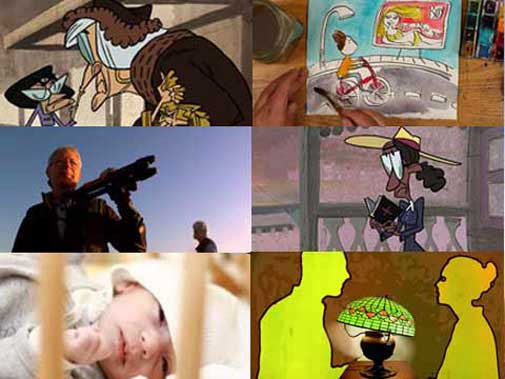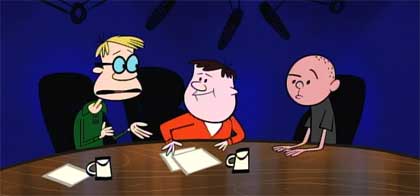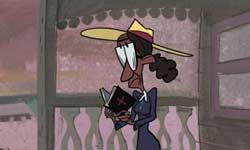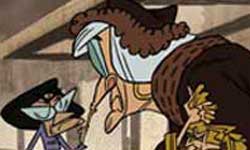
The latest edition of the PBS series P.O.V., premiering Tuesday night at 10 ET (check local listings), is a potpourri program called Short Cuts, an hour of six entertaining short films. They're all good -- but two of them, animated versions of conversations recorded for the oral history project StoryCorps, are gold. And it's gold that, like the Simpsons shorts originally featured on The Tracey Ullman Show, should be spun off into their own regular series.
It could be the most popular, and profitable, and even important, new PBS series in years...
StoryCorps, whose casual conversations can be heard weekly on NPR's Morning Edition, has begun producing animation to accompany its audio recordings.

It's the same idea behind HBO's The Ricky Gervais Show, which animated existing podcast recordings featuring freewheeling conversations between Gervais, writing partner Stephen Merchant and radio producer Karl Pilkington. That show has proven to be a delight, as well as a very clever example of multimedia repurposing. Migrating StoryCorps from radio to TV could -- and should -- prove just as delightful.
It's not just the stories that make the StoryCorps narratives so fascinating. It's the voices, and the tender relationships between the subjects and their interviewers -- almost always friends, family members or lovers. They're fun, and often very touching, to hear -- and, as it turns out, to see.
Here's a quick example -- four minutes long -- from Short Cuts: a StoryCorps animated film called No More Questions!, directed by the Rauch Brothers. Enjoy -- and imagine a 30-minute or one-hour show filled with similar wonderful material:

The other StoryCorps piece on Short Cuts is Miss Devine, a fond reminiscence about a stern Sunday-school teacher. It's only three minutes long, but I haven't stopped smiling about it since I watched it.
Many times, when driving around listening to public radio, I encounter one of the StoryCorps segments and begin driving cautiously -- not knowing, by the end of it, whether I'll be laughing uncontrollably or sobbing quietly. The short, sweet reports, which would translate perfectly to television, are priceless.
In terms of natural resources, they're also endless. Since the StoryCorps oral-history project was launched eight years ago, more than 35,000 interviews have been archived. Take only the best one percent for starters, and that's 350 nuggets of gold to farm out to animators -- lots of different animators, with lots of styles from lots of countries.

Vary the look as well as the sound -- and the emotional mix -- as much as possible in each 30-minute or one-hour compendium, and PBS could have a hit on its hands.
A hit, as well as a trickle-up creative enterprise that showcases people of all nationalities and ages, stories from all walks of life, and animation and music from all over the world. The raw material already exists -- and every syllable was provided, as the PBS underwriting credits often say, "by people like you."
So I ask you -- and, more pointedly, I ask PBS: What other show, on air or in the pipeline, more directly represents the literal premise, and promise, of public television?